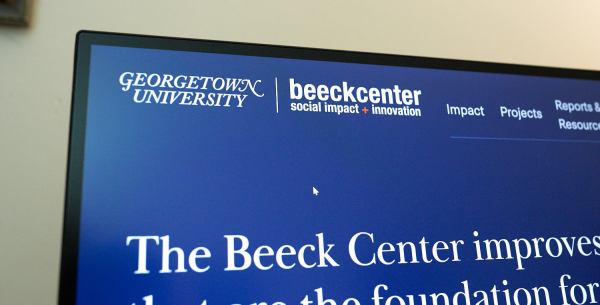Beeck Center, NGA launch ‘Data Labs’ to help states recover from pandemic

The Beeck Center for Social Impact and Innovation at Georgetown University on Monday announced a new partnership with the National Governors Association to assist state government officials working on data-driven projects as they help their communities recover from the COVID-19 pandemic.
The training and technical assistance program, called Data Labs: Roadmap to Recovery, intends to pair state governments with data scientists and subject matter experts to take on issues including housing and homelessness, small business support, higher education and workforce.
“We’re really looking to equip states with an actionable plan to address one of these four issues,” said Tyler Kleycamp, a Beeck Center fellow and director of the state chief data officers network. “I almost look at it as these are things people would be doing over email, and if we can just bring them together for some focused activity around this in developing this plan, that they’ll actually be set up for success to implement it.”
Kleycamp said the program, which is set to run from September through May, will be tailored to the needs of each state as officials look to pit their data against challenging issues. Data-driven technology projects, such as data dashboards used to monitor COVID-19 cases, grew in popularity among state governments during the pandemic. But many still lack technical talent, said Kleycamp, who served five years as the chief data officer of Connecticut.
“I don’t think it’s any secret states have a hard time bringing in the analytic or data-science type of talent to work on some of this stuff,” he said. “[This is] really bridging the gap between the people who are more in the policymaking positions and the data people to get them working a little more hand-in-glove on some issues.”
Through monthly cohort check-ins for groups working on the same issues, biweekly state team meetings and individual work, states will draw on the expertise of those who have experience working with government data, Kleycamp said, naming legal hurdles as a common challenge for agencies seeking to use their data in new ways.
Kleycamp said he hopes this program will encourage states to be more “targeted” in how they implement programs, reaching out directly to communities most affected by the pandemic to offer eviction prevention, housing subsidies or small business services, for instance. Data, he said, is the tool to enable such a targeted approach.
“Getting those resources and tools into the hands of the people that need them most is really ultimately what we’re trying to do here,” he said. “We want to make sure we can equip them with as much information as possible so they can make informed and equitable decisions.”






